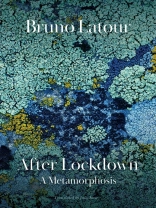After the harrowing experience of the pandemic and lockdown, both states and individuals have been searching for ways to exit the crisis, many hoping to return as soon as possible to ‘the world as it was before the pandemic’. But there is another way to learn the lessons of this ordeal: as inhabitants of the earth, we may not be able to exit lockdown so easily after all, since the global health crisis is embedded in another larger and more serious crisis – that brought about by the New Climate Regime. Learning to live in lockdown might be an opportunity to be seized: a dress-rehearsal for the climate mutation, an opportunity to understand at last where we – inhabitants of the earth – live, what kind of place ‘earth’ is and how we will be able to orient ourselves and exist in this world in the years to come. We might finally be able to explore the land in which we live, together with all other living beings, begin to understand the true nature of the climate mutation we are living through and discover what kind of freedom is possible – a freedom differently situated and differently understood.
In this sequel to his bestselling book Down to Earth, Bruno Latour provides a compass for this necessary re-orientation of our lives, outlining the metaphysics of confinement and deconfinement with which we will all be obliged to come to terms by the strange times in which we are living.
Jadual kandungan
1. One way of becoming a termite
2. Locked-down in a space that’s still pretty vast
3. ‘Earth’ is a proper noun
4. ‘Earth’ is feminine, ‘Universe’ is masculine
5. A whole cascade of engendering troubles
6. ‘Here below’ – except there is no up above
7. Letting the economy bob to the surface
8. Describing the territory, only, the right way round
9. The unfreezing of the landscape
10. Multiplying the number of mortal bodies
11. The return of ethnogeneses
12. Some pretty strange battles
13. Scattering in all directions
14. A little further reading
Mengenai Pengarang
Bruno Latour’s transdisciplinary work, ranging across philosophy, history, anthropology and sociology, has positioned him as one of the world’s most influential thinkers. After teaching at the École des Mines in Paris from 1982 to 2006, he was appointed Professor at the Institut d’études politiques (Sciences Po), where he served as vice-president for research from 2007 to 2013. His many books include Laboratory Life, We Have Never Been Modern, Facing Gaia and Down to Earth.












